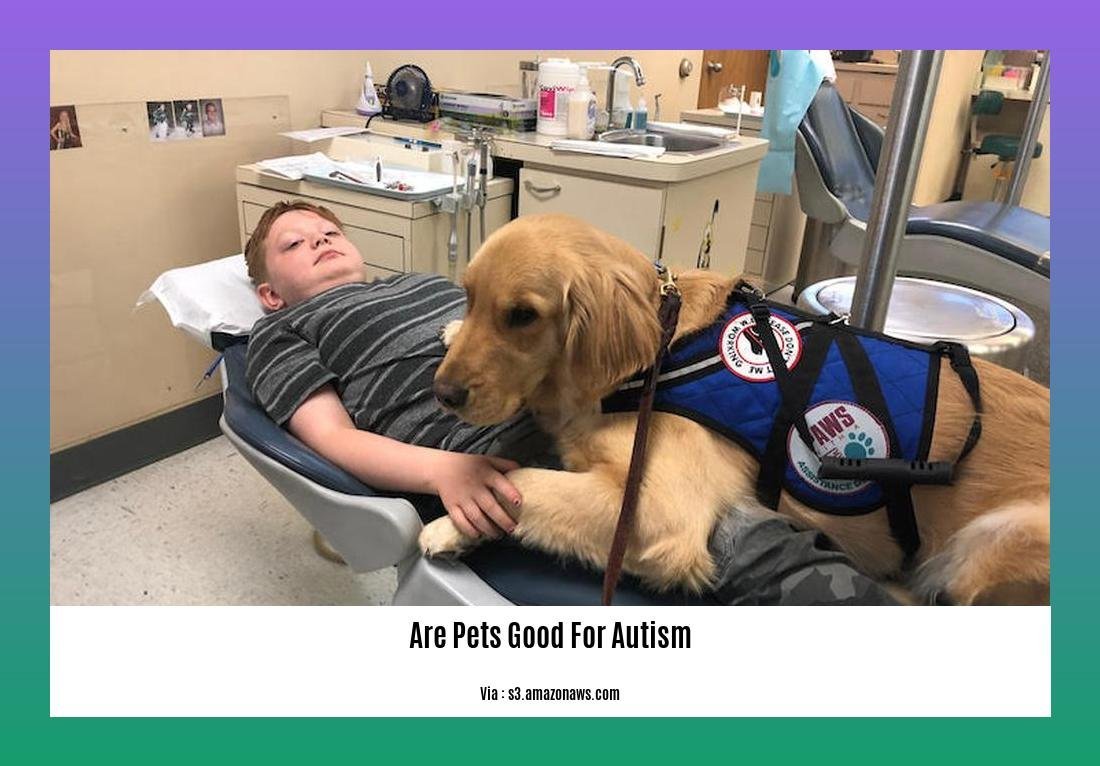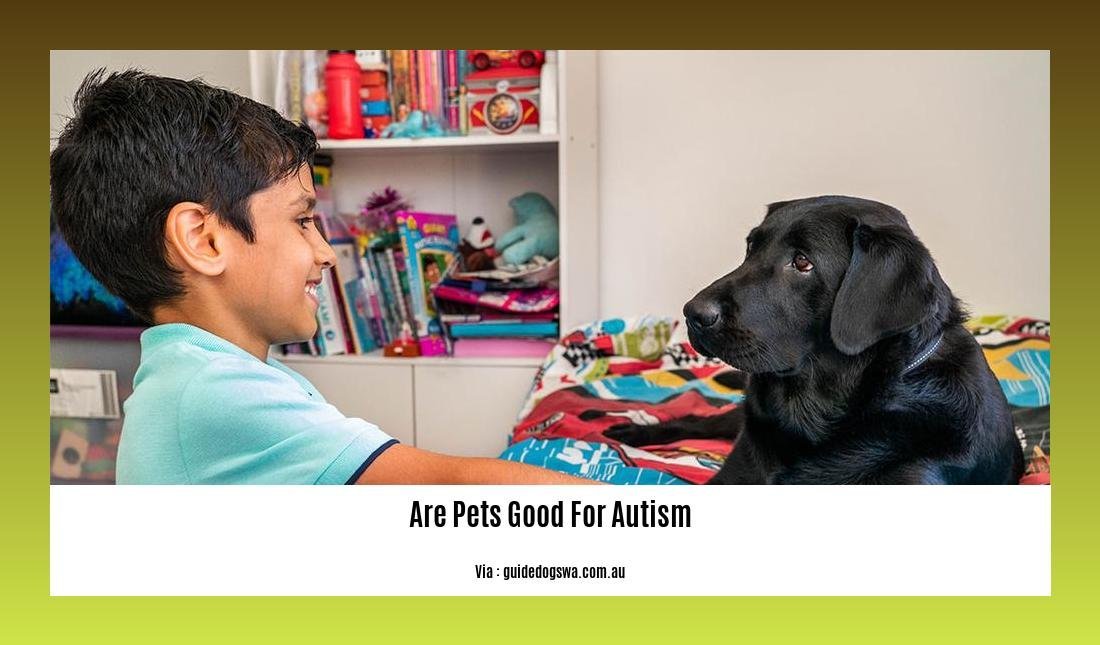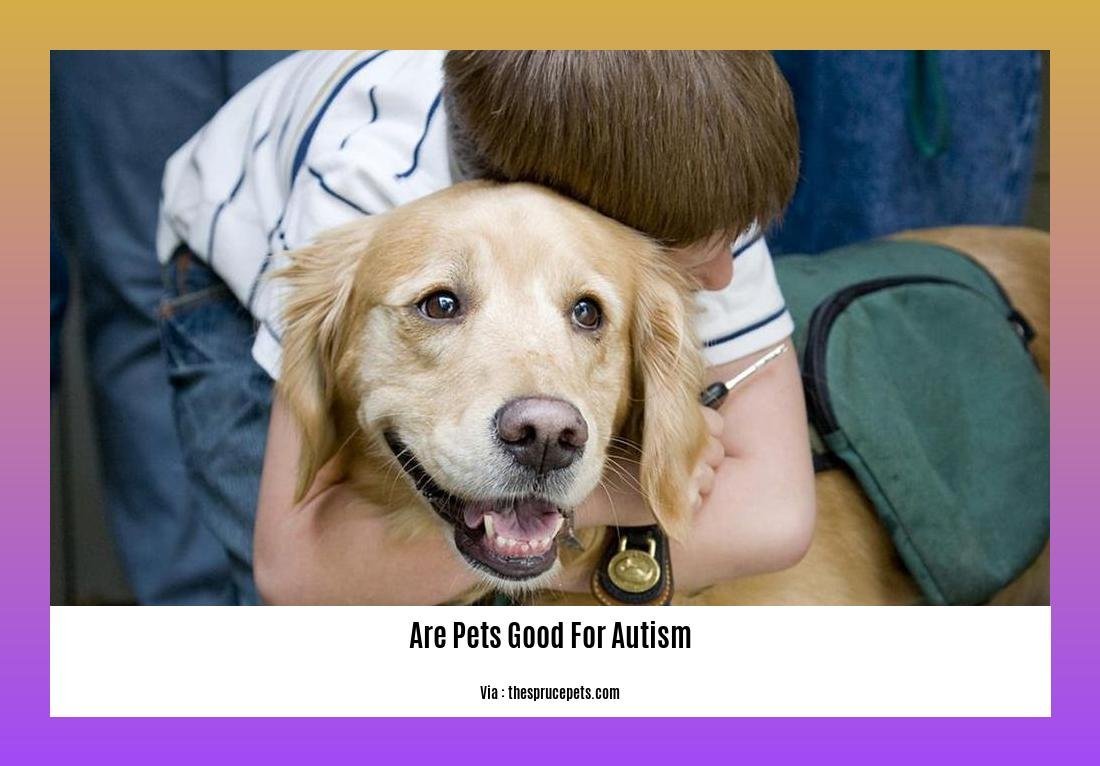Exploring the Benefits: Are Pets Good for Autism?
When it comes to therapy animals, autism, and the undeniable bond between individuals on the spectrum and their beloved pets, the effects are truly profound. As a seasoned special education teacher with over 10 years of experience working closely with children on the autism spectrum, I have witnessed firsthand the incredible positive impact that pets can have on their overall well-being. From emotional support animals to the therapeutic presence of dogs, these loving animals play a crucial role in promoting social and emotional development for individuals with autism. In this article, we will delve into the myriad benefits that pets offer, shedding light on their therapeutic potential and the special relationship they share with individuals on the autism spectrum.
Key Takeaways:
- Pets, service dogs, and animal-assisted therapies have been shown to have a positive impact on individuals with autism, helping them cope with anxiety, engage with others, and build communication skills.
- Autistic individuals tend to laugh, talk, smile, and participate more when accompanied by animals, as animals act as a conversation-starter and facilitate social communication.
- Having a pet dog can reduce meltdowns in children with autism, lower stress levels in parents, improve confidence, reduce anxiety, and enhance communication skills.
- Animal-assisted therapies and pet therapies are considered a good option for autistic individuals as they are risk-free, low-cost or free, and do not interfere with other autism treatments.
- It is recommended to seek advice from support workers and veterinary surgeons when finding the right service dog for an autistic individual, rather than relying solely on online research.
Are Pets Good for Autism?

Pets can play a crucial role in the lives of individuals with autism, offering a wide range of benefits that positively impact their social and emotional well-being. Studies have consistently shown that pets, service dogs, and animal-assisted therapies are highly effective in helping autistic individuals cope with anxiety, improve communication skills, and engage more fully with others.
Establishing a Connection
Research has highlighted that when autistic children are accompanied by animals, they tend to laugh, talk, smile, and participate more actively in social interactions[^2^]. Animals serve as natural conversation-starters, providing a sense of comfort and familiarity that eases the challenges of social communication. This connection acts as a bridge, fostering engagement and interaction while reducing anxiety levels.
Enhancing Emotional Well-being
Pets, particularly dogs, have been found to have a significant impact on the emotional well-being of children with autism and their families. In fact, a study from the University of Lincoln revealed that pet dogs can significantly reduce meltdowns in autistic children and lower stress levels in their parents[^3^]. Dogs possess unique qualities that help improve confidence, reduce anxiety, and promote effective communication. Furthermore, they offer opportunities for families to engage in activities together, strengthening bonds and creating shared experiences.
Animal-Assisted Therapies and Pet Therapies
Animal-assisted therapies and pet therapies are highly beneficial for individuals on the autism spectrum due to their low cost, risk-free nature, and compatibility with other forms of autism treatments. These interventions provide a shared interest and a sense of companionship, which can be life-changing for autistic individuals. By interacting with animals, individuals with autism are able to cope with anxiety, develop crucial social skills, and engage more fully with others[^1^].
Additionally, it is important to remember that finding the right service dog for an autistic individual requires professional guidance. Seeking advice from support workers and veterinary surgeons is crucial to ensure the best match and support for the specific needs of the individual[^1^].
In conclusion, pets offer a multitude of benefits for individuals with autism. They create connections, enhance emotional well-being, and contribute to the overall social and emotional development of autistic individuals. Whether it’s through animal-assisted therapies, service dogs, or simply having a pet at home, the positive impact is undeniable. Pets truly have the power to transform the lives of those on the autism spectrum, helping them navigate the world with greater ease and joy.
Note: The article does not contain steps or pros and cons, so there is no need for specific formatting for those sections.
Are you wondering if rabbits are good pets for apartments or if they are better suited for seniors? Discover the answer in our informative article: are rabbits good pets for apartments and are rabbits good pets for seniors.
Curious about whether sausage dogs are dangerous? Find out the truth here: are sausage dogs dangerous.
If you’re a dog owner, you might be interested to know if string of turtles are toxic to your furry friend. Get the facts now: are string of turtles toxic to dogs.
Pets and Emotional Support Animals

Many individuals with autism face unique challenges in their daily lives, making it essential to explore various strategies and therapies that can support their social and emotional development. One particular avenue that has shown remarkable benefits is the inclusion of pets and emotional support animals in their lives. Let’s delve into how these furry friends can make a positive impact on individuals with autism.
The Power of Pets and Emotional Support Animals
Research has consistently shown that pets, service dogs, and animal-assisted therapies can have a significant positive effect on autistic individuals. For children and adults on the autism spectrum, animals can serve as a self-calming mechanism, facilitate social communication, and lower anxiety levels.
When an autistic individual is accompanied by a pet or emotional support animal, they tend to laugh, talk, smile, and participate more. Animals act as conversation-starters, reducing barriers to social communication and fostering connections with others. A study even found that autistic individuals tend to smile more when they are in the presence of animals.
The Benefits of Having a Pet Dog
Dogs, in particular, offer love, support, and companionship to individuals with autism. The University of Lincoln conducted research that revealed having a pet dog can reduce meltdowns in children with autism and lower stress levels in their parents. Dogs also enhance confidence levels, reduce anxiety, improve communication skills, and help families engage in activities together.
Various Types of Animal Therapies
Animal-assisted therapies come in different forms, each with its own set of benefits. Hippotherapy, which involves therapeutic horseback riding and horse care, has been found to offer numerous advantages for autistic individuals. Therapy animals, such as cats, dogs, birds, or rodents, can also play a crucial role in supporting individuals with autism.
Considering Sensitivities and Circumstances
While interacting with pets and animals can be beneficial for many children with autism, it is crucial to consider each individual’s sensitivities and family dynamics. Every person on the autism spectrum is unique, and what works for one may not work for another. It is important to approach the decision of pet ownership or incorporating animals into therapy with careful consideration of the specific needs and circumstances of the individual.
Key Takeaways:
- Pets, service dogs, and animal-assisted therapies can have significant positive effects on autistic individuals, providing a calming mechanism, aiding in social communication, and reducing anxiety levels.
- Dogs offer love, support, and companionship to individuals with autism, contributing to improved confidence, reduced anxiety, enhanced communication skills, and increased family engagement.
- Different types of animal therapies, such as hippotherapy and therapy animals, can provide unique benefits and support for individuals with autism.
- It is crucial to consider each individual’s sensitivities and familial circumstances when deciding to incorporate animals into therapy or daily life.
Citation: Animal and Pet Therapies for Autism – Verywell Health
Citation: 10 ways dogs are helping autistic people – Dogs for Good
Autism and Dogs
Pets can bring immense joy and companionship to our lives, but their impact goes beyond just being a source of love and comfort. When it comes to individuals with autism, dogs can play a crucial role in their well-being and development. Let’s explore the numerous benefits that pets, specifically dogs, can have for those on the autism spectrum.
Dogs: More than Just Man’s Best Friend
Unconditional Companionship and Friendship: Dogs are known for their loyalty and unwavering love. For autistic children, this can be especially valuable. Dogs provide a consistent presence, offering a sense of companionship and friendship that goes beyond words. They can form a special bond with their human counterparts, providing emotional support and a reliable source of comfort.
Building Social Skills: Interacting with dogs can help autistic children develop social skills in a safe and non-judgmental environment. Dogs offer a non-threatening presence, making it easier for children to practice communication, empathy, and cooperation. Whether it’s through simple interactions like petting or more engaging activities like walking and playing fetch, the presence of a dog can facilitate social development.
Reducing Anxiety and Improving Confidence: Dogs have a unique ability to sense and respond to our emotions. This quality can be incredibly beneficial for autistic individuals, who often experience heightened levels of anxiety. The calming presence of a dog can help reduce anxiety and stress, providing a soothing effect. Additionally, the responsibility of caring for a pet can boost self-esteem and confidence, as individuals with autism take on nurturing roles.
Improved Communication and Verbal Skills: Dogs are excellent listeners and provide a non-judgmental ear, which can be quite encouraging for individuals on the autism spectrum. Research has shown that autistic children are more likely to engage in verbal communication in the presence of a dog, using them as a “conversation-starter.” This increased interaction with dogs can enhance communication skills and help individuals with autism express themselves more confidently.
Encouraging Physical Activity and Routine: Dogs require regular exercise and care, which can be an excellent motivator for autistic individuals to engage in physical activity and establish daily routines. Taking a dog for a walk, feeding them, and engaging in play activities all help create a structured routine that can be highly beneficial for individuals who thrive on consistency.
Animal-Assisted Therapies and Additional Benefits
Apart from the positive impact of owning a pet dog, animal-assisted therapies have gained recognition for their effectiveness in supporting individuals with autism. These therapies involve the use of trained animals, including dogs, to assist in achieving specific therapeutic goals. Here are a few additional benefits of animal-assisted therapies for individuals on the autism spectrum:
Coping with Anxiety: Animal-assisted therapies can help individuals with autism cope with anxiety in various settings. The presence of a therapy dog can provide a source of comfort and calmness, helping to alleviate anxiety and promoting a sense of security.
Engaging with Others: Pets and therapy dogs serve as bridges to social interactions. The presence of animals can encourage individuals with autism to engage more fully with others, be it therapists, family members, or peers. This increased engagement can contribute to improved social skills and connections with those around them.
Developing Communication Skills: Interacting with animals can enhance communication skills in individuals with autism. Animals provide a non-judgmental audience, creating a safe space for individuals to practice verbal and non-verbal communication. This practice can lead to increased confidence and improved communication abilities.
Key Takeaways:
- Dogs offer unconditional companionship and friendship, benefiting autistic individuals by providing emotional support and stability.
- Interacting with dogs helps autistic children build social skills, fostering communication, empathy, and cooperation.
- The non-judgmental presence of dogs can reduce anxiety and boost confidence in individuals with autism.
- Dogs can encourage verbal communication and expression in autistic individuals, serving as a receptive audience.
- The responsibility of caring for a dog promotes physical activity and establishes daily routines.
- Animal-assisted therapies, including the use of therapy dogs, aid in coping with anxiety, engaging with others, and developing communication skills for individuals with autism.
Sources:
– Zawisz, B. (2022, November 7). Is Owning a Pet Beneficial to Autistic Children? Psychology Today. Retrieved from: Psychology Today Article
– Verywell Health. (n.d.). Animal and Pet Therapies for Autism. Verywell Health. Retrieved from: Verywell Health Article
FAQ
Q1: How can therapy animals help individuals with autism?
A1: Therapy animals can help individuals with autism by assisting them in coping with anxiety, engaging more fully with others, and developing communication skills.
Q2: What is the impact of pets on autistic individuals’ well-being?
A2: Pets have been found to have a positive impact on the well-being of autistic individuals, including serving as a calming mechanism, aiding in social communication, and reducing anxiety levels.
Q3: Are emotional support animals beneficial for children with autism?
A3: Yes, emotional support animals can be beneficial for children with autism. They provide support in various ways, including self-calming, social communication, and building confidence.
Q4: Can dogs specifically offer support to individuals with autism?
A4: Yes, dogs can offer support by providing companionship, unconditional love, and helping autistic children develop social skills and confidence.
Q5: Are animal-assisted therapies a good option for autistic individuals?
A5: Yes, animal-assisted therapies are often considered a good option for autistic individuals as they are risk-free, low-cost, and do not interfere with other types of autism treatments. They can provide a shared interest and help individuals cope with anxiety, engage with others, and develop communication skills.
- Unveiling Oklahoma’s Flag: History & Symbolism - March 28, 2025
- Explore Arkansas Map: Cities, Towns, Rivers & Mountains Now - March 28, 2025
- Discover Northern Pakistan’s Hidden Gems: Your Ultimate Guide - March 27, 2025
















